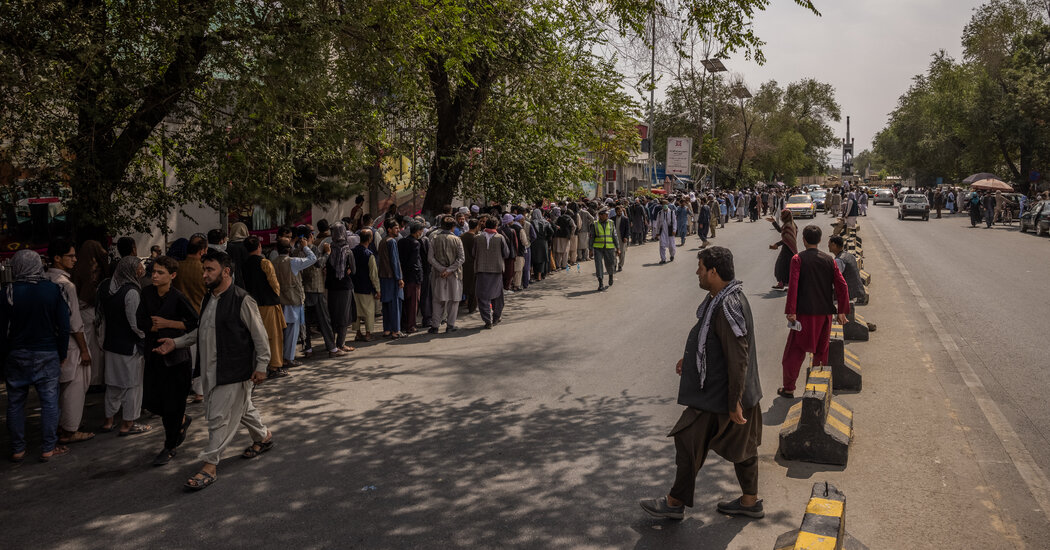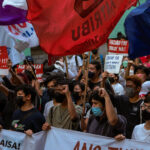
WASHINGTON — Exiled Afghans are urging a federal judge to reject the effort by relatives of victims of the Sept. 11 attacks to seize $3.5 billion in frozen Afghan central bank funds to pay off judgment debts owed by the Taliban, recent court filings show.
In three filings, groups of Afghans argued that the frozen money belonged to the Afghan people, not the Taliban. They portrayed any diversion of the funds as unlawful and immoral at a time when their country’s economy is collapsing, causing a swelling humanitarian crisis and exodus of migrants.
Lawyers for Naseer Faiq, a diplomat from the former Afghan government who continues to run its mission to the United Nations over the objections of the Taliban, wrote that he “fully supports compensation for the victims of the Taliban.” But it was wrong to take that compensation from assets that he said belonged to the Afghan people as a whole, the lawyers said.
“That compensation cannot come from the Afghan people, who are neither morally nor legally responsible for the tragic events of Sept. 11, 2001, or the other acts of terrorism committed by the Taliban,” the brief continued. Many Afghans helped the United States fight the Taliban, it noted, arguing that the Afghan people were victims of the Taliban, too.
The Afghans’ objections add to the dilemma facing the Federal District Court judge presiding over the complex litigation, Judge George B. Daniels of the Southern District of New York, who is still deciding whether the money can be used to pay off the families of Sept. 11 victims. Magistrate Judge Sarah Netburn is assisting him in that effort.
The high-stakes case arises from the extraordinary spectacle of a sanctioned terrorist organization that has taken over a country by military force but is not recognized as its legitimate government. The case raises novel legal issues that touch on matters of foreign policy, international finance, counterterrorism and domestic politics.
Reporting From Afghanistan
Two plaintiffs from a group that has taken the lead in trying to seize the funds — Fiona Havlish and Ellen Saracini, who lost their husbands in the attacks — said in a statement that “our hearts are with the Afghan people who are suffering under the Taliban rule.”
But, citing the Taliban’s “command over all aspects of life in Afghanistan, including the central bank,” they argued that “the court should apply the law as Congress has written it to satisfy the judgments we and others have justly held against the Taliban for so many years.”
The dispute over the funds traces back to lawsuits filed years ago by relatives of people killed in the Sept. 11 attacks. The families sued groups like Al Qaeda and the Taliban for their losses, winning by default when the defendants did not show up in court. At the time, the judgments seemed symbolic since there was no way to collect the money.
But when Afghanistan’s government collapsed during the Taliban takeover in August, its central bank — known as Da Afghanistan Bank, or DAB — had accumulated $7 billion deposited at the Federal Reserve of New York. Because it was no longer clear who had lawful access to those funds and sanctions prohibited financial dealings with the Taliban, the Federal Reserve suspended access to DAB’s account.
In September, lawyers for a plaintiffs’ group in the Havlish case — about 150 people, linked to 47 estates of the nearly 3,000 people killed in the Sept. 11 attacks — persuaded a judge to send a U.S. marshal to serve the Federal Reserve of New York with a writ of execution to begin seizing the Afghan funds to pay off its judgment debt. That has set off a scramble by other plaintiff groups who demanded a share in the funds.
The Biden administration intervened, saying it wanted to study the matter before informing the court what the U.S. government thought its interests were. President Biden used an executive order in February to formally freeze all the funds, and then set aside half of them for the purpose of aiding the Afghan people.
The top State Department official for Afghanistan, Tom West, later said in an onstage interview that the administration believed the best use of that $3.5 billion would be to recapitalize an independent central bank and revive the country’s collapsing financial system rather than fund humanitarian assistance like food and medicine.
Mr. Biden’s move left the remaining $3.5 billion in the central bank’s account for the relatives of Sept. 11 victims to continue pursuing in court. Most — but not all — of the other plaintiff groups eventually agreed to back the Havlish group’s claim in exchange for what would be a proportionally smaller share of the proceeds, subject to Judge Daniels’s approval.
But the judge has yet to determine whether the funds can be used for that purpose. The administration did not take a clear position on what he should do.
Under a 1978 law, the assets of a foreign state held in the United States are usually shielded by sovereign immunity. But Congress has carved out a narrow exception for certain terrorism situations. A 2002 law says if someone has obtained a judgment against a terrorist party for an act of terrorism, the blocked assets of “any agency or instrumentality of that terrorist party” can be seized to pay off the debt.
The 2002 law has been used to seize assets of Iran and Cuba, which had been designated as state sponsors of terrorism. The question is whether the Afghan central bank qualifies under the present circumstances — in which Afghanistan has not been deemed a state sponsor of terrorism, but a sanctioned terrorist group has seized control and become the country’s de facto government without being legally recognized.
The Havlish plaintiffs have argued that the bank qualifies as an agency or instrument of the Taliban, and that turning over the assets would extract a measure of justice “from the terrorist group that nurtured, protected and supported Al Qaeda.”
But leaders of an Afghan civil society organization argued that paying off the Taliban’s debts with the funds of the Afghan people would instead confer implicit recognition of the Islamist group’s “violent takeover of their country” and “permit the Taliban to be relieved of a judgment against them without bearing the punitive effects of payment of the judgments.”
While Mr. Biden’s move protected half of the Afghan bank’s assets from the Sept. 11 plaintiffs, the fact that he left the other half for them to continue pursuing in court provoked sharp criticism in Afghanistan, as well as among some other relatives of Sept. 11 victims, who objected to seizing the funds.
Unfreeze Afghanistan, an American group that also opposes giving the money to relatives of the Sept. 11 victims, instead advocated releasing the assets to the Afghan central bank so that it could resume helping the banking system and broader economy function — including through regular injections of hard currency.
The group’s brief suggested that the technocrats at the bank could make currency infusions work to help the Afghan economy start functioning again without the money being diverted to the Taliban, using controls and transferring the funds in tranches subject to monitoring, with any further transfers halted if that were to happen.
Mr. Faiq was more cautious, suggesting that the funds could eventually be used to recapitalize an independent central bank for the country “whenever and however that can be done in compliance with sanctions against the Taliban.”
Criticizing Mr. Biden’s move to protect only half the bank’s assets from the lawsuits, a letter from nine former female Afghan leaders also said, “We do not understand why this protection sought should not extend to the full $7 billion that have been frozen.”
They added: “These funds were put outside the country for the sole purpose of safeguarding them, and they are needed to support the Afghan currency. We would expect U.S. authorities, including the courts, to protect the assets of our central bank — not just half but in full.”




